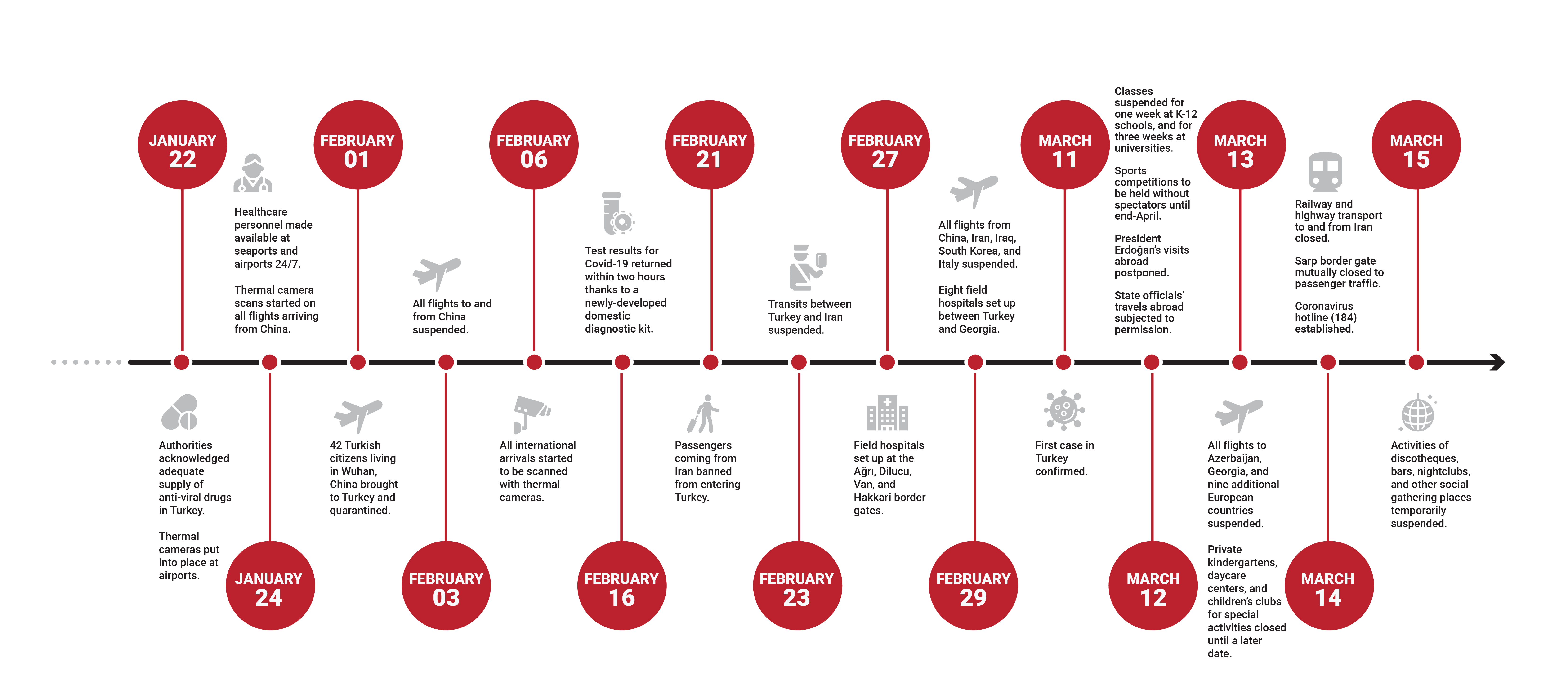TÜRKİYE’S ECONOMIC POLICY RESPONSE TO COVID-19
Covid-19, a new type of coronavirus first detected on December 12, 2019 in Wuhan, China, has caused a global pandemic. As of today, it has infected more than 125 million people around the globe, and it is spreading rapidly almost in all countries.
The Investment Office sends its heartfelt condolences to people who have lost their lives due to the pandemic, and wish a quick recovery for those infected.
Thanks to the great transformation Türkiye has made in the fields of services and infrastructure during the past 17 years, Türkiye is well prepared to face this pandemic.
Türkiye has been managing the Covid-19 situation since its inception. Policymakers, regulators, and all economic authorities are vigilantly following the developments and are taking all necessary measures to reassure the markets.
ECONOMIC STABILITY SHIELD PROGRAM
President Recep Tayyip Erdoğan announced a TRY 100 billion-Economic Stability Shield program on March 19. The package aims to secure employment, bolster the real sector, and address the prevailing concerns on liquidity and financing in the market.
- Tax declaration, VAT discount, and social security payments for April, May, and June have been postponed for a period of 6 months in the following sectors: retail, iron & steel, automotive, logistics, transportation, cinema & theater, accommodation, food & beverage, textile, and event organization.
- Accommodation tax will be delayed until November.
- The easement rights and revenue share payments related to hotel rentals for April, May, and June have been postponed for a period of 6 months.
- VAT has been lowered to 1% from 18% for a period of 3 months on domestic flights.
- Principal and interest rate payments of companies having cash flow problems due to Covid-19 outbreak precautions will be postponed for a minimum of 3 months. Additional financial support will be available if required.
- Inventory financing support will be available for exporters in order to protect capacity utilization rates.
- Principal and interest rate payments of artisans and craftsmen to Halkbank for April, May, and June will be postponed for a period of 3 months free of interest.
- The Credit Guarantee Fund limit will be increased from TRY 25 billion to TRY 50 billion. Loan priority will be channeled to companies and SMEs that need liquidity and that are showing a collateral deficit due to the negative effects of recent developments.
- Social credit packages will be incentivized under the most favorable and advantageous conditions for citizens.
- The mortgageable amount for houses under TRY 500,000 will be raised from 80% to 90%, meaning the minimum down payment has been reduced to 10%.
- Companies that default in April, May, or June due to the measures taken against the spread of the virus will have a “force majeure” note on their credit record.
- Minimum wage support will continue.
- Flexible and remote working models will be utilized to allow for operations to continue efficiently.
- Short Work Allowance will be facilitated, and the processes required to benefit from this opportunity will be eased and accelerated. Thus, the cost of employers will be reduced, while temporary income support will be provided to employees in workplaces that suspend its activities.
- The lowest pension wage will be increased to TRY 1,500.
- The Eid payment for the retired will be paid at the beginning of April.
- The Ministry of Family, Labor, and Social Services will provide financial support of TRY 2 billion for needy families.
- The 2-month compensation working period will be increased to 4 months to provide sustainability in employment.
- Follow-up programs including social services and periodical homecare visits will be initiated for the elderly who are above 80 years old and live alone.
- The maturities for repayments of rediscount credits, which will be due from April 2020 to June 2020, will be extended to October 2020 to December 2020, and the maximum maturity has been extended by 1 year. An additional 12 month-export commitment fulfillment time has been offered for the rediscount credits maturing in April, May, and June 2020.
ADDITIONAL MEASURES IN THE STIMULUS PACKAGE
Türkiye is taking all necessary measures to ensure continuity in economic activity.
- Rent will not be collected for a period of 2 months from technopark enterprises.
- SMEs’ KOSGEB payments will be postponed to June 30.
- TRY 6 million worth of support will be provided to local producers of disinfectants, protective clothes, goggles, face shileds, and masks.
- Additional import duty for medical masks has been lifted.
- Additional customs duty for medical ventilators has been lifted.
- Tariffs on ethyl alcohol (ethanol) have been zeroed.
- Stock financing support will be provided to exporters.
- VAT return submission and payment terms have been deferred.
- Taxes will not be deducted from municipalities for a period of 3 months.
- The accommodation tax will not be implemented until November.
- VAT has been reduced to 1% for domestic air transportation for a period of 3 months.
- Additional financing support will be provided to companies with impacted cash flow where required.
- "LOAN SUPPORT TO CONTINUE WORK" will be provided to cover operating capital needs.
- With Business Financing Support, 6 month-deferred payment and a 36 month-instalment loan facility capped at TRY 25,000 will be provided.
- A 3-month deferral on payments of loans and 12 months instalment, as well as Merchant Card support will be provided.
- Credit card payments can be deferred till the end of June.
- Additional loan facility limit equal to the staff salaries expense will be provided.
MONETARY POLICY AND MACRO-PRUDENTIAL REGULATION
As part of the Economic Stability Shield Program, regulators in Türkiye took some measures to cope with the possible effects of the pandemic.
On March 16 and 31, the Central Bank of the Republic of Turkey (CBRT) introduced "Measures Against the Likely Economic and Financial Impacts of the Coronavirus".
- Lowering the main policy rate from 10.75% to 9.75%.
- Reducing FX reserve requirement ratios by 500 basis for banks meeting CBRT's real credit growth conditions.
- Extension of securities accepted as collateral in transactions with banks.
- Readiness to inject liquidity through repo auctions with maturities of up to 91 days.
- Offering banks additional liquidity facilities to secure uninterrupted credit flow to corporate sector.
- Further increasing the limits of liquidity facilities supporting uninterrupted credit flow to corporate sector.
- Increasing liquidity limits of Primary Dealers in Open Market Operations (OMOs).
- A number of improvements were granted in the provision of rediscount credits for exporters and FX earning services.
- Extension of available rediscount credits for exporters (70% allocated to SMEs in export credits intermediated by banks).
On March 17 and 30, the Banking Regulation and Supervision Agency introduced a set of measures to avoid any interruption in banking industry.
- The number of days to be passed in the delay period for classifying a loan as non-performing has been increased from 90 days to 180 days.
- Customers' principal and interest payments have been postponed for a period of at least 3 months upon request.
- Loans to collateral ratio on mortgage loans has been increased from 80% to 90%.
- Flexibility has been granted to banks for not classifying a performing forborne loan under probation as nonperforming even though additional forbearance measures are applied or it becomes more than 30 days past due.
- Forbearance measures have been applied to the measurement of the capital adequacy ratio, of the foreign exchange net general position, and of the own funds of banks.
- The minimum front payment ratio in credit card transactions has been reduced from 30% to 20%, and authorized card holders under debt restructuring arrangements can postpone their reimbursements until December 2020.
With successive measures on February 28, March 13 and March 23, the Capital Markets Board of Turkey introduced certain measures.
- Imposed a ban on short selling to control price volatility.
- Announced new conditions for issuers to buy back their shares without limitations.
- Tightened circuit breakers.
- Allowed extra flexibility for margin trading transaction.
- Extended the reporting periods of financial reports by portfolio management companies, mutual funds and capital market instruments traded on a stock exchange or other organized marketplaces.
HEALTHCARE SYSTEM
Türkiye is well prepared to face Covid-19 pandemic with its strong healthcare system.

14%
CAGR in healthcare expenditures during the past 6 years.

1,518
Hospitals.

166,000
Doctors.

1,100,000
Healthcare employees.

240,000+
Hospital beds.

100,000
Single patient rooms.

40,000
Intensive care units.

32,000
Healthcare professionals to be employed as part of the stimulus package.
CITY HOSPITALS
In the past decade, Türkiye has accelerated the roll out of PPP city hospitals across the country.

30,607
Total bed capacity.

19,354
Rooms.

5,189
Intensive care units.

7,803
Polyclinics.

1,085
Surgery rooms.

12
City hospitals that have been launched across 11 cities.
(22 projected)
ECONOMIC SUPPORTS

TRY 200 billion
Total funding allocated so far as part of the financial stimulus package, exceeding the TRY 100 billion threshold.

4.4 million
Families within the scope of TRY-1,000 cash aid.

3 million
Employees supported within the short-term employment allowance scheme.

4 million
Citizens provided with TRY 10,000 loan support.

TRY 22.3 billion
Amount of loans allocated to 4 million citizens.

582,000
Tradesmen applied for Halkbank's TRY 25,000-loan facility.

448,148
Tradesmen applications completed so far.

TRY 8.4 billion
Loans allocated to tradesmen so far by state-owned banks.

TRY 16.9 billion
Total financing support to tradesmen including Paraf Card.

TRY 107.4 billion
Financing provided to 119,800 companies applied for CGF-backed Business Support Program.
TIMELINE OF TÜRKİYE’S MEASURES AGAINST COVID-19
